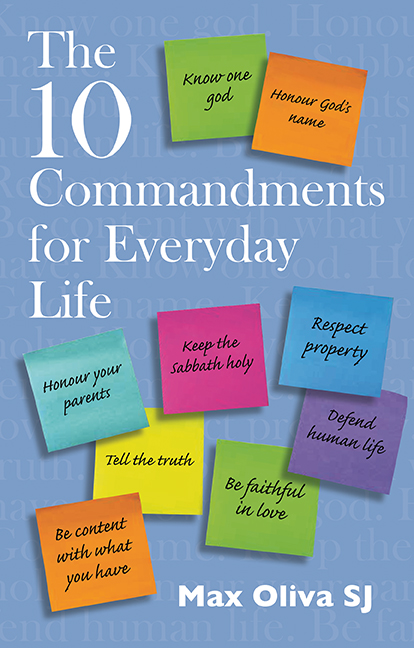
The 10 Commandments for Everyday Life
 “The realization of a vocation came to me out of the blue,” writes Fr. Max Oliva in The Ten Commandments for Everyday Life.
“The realization of a vocation came to me out of the blue,” writes Fr. Max Oliva in The Ten Commandments for Everyday Life.
I was 24 years old, had a full social life, was driving the car of my dreams (it was a silver blue Austin Healey convertible!) and had a very good job as a salesman for a food cannery. …In fact, since the idea of being a Jesuit and a priest came so suddenly, when I decided to give it a try I asked my father if I could leave my car at his house. I asked him to keep it for six months and not sell it, in case the vocation didn’t work out. If it didn’t, I wanted the car back!
That was about fifty years ago, by Fr. Oliva’s reckoning. No word on what happened the car afterwards.
Most readers of The Ten Commandments aren’t likely to be hit upside the head with the same call to God’s work that Fr. Oliva was. Fortunately, this is their book. The Ten Commandments strengthens and deepens the reader’s faith—a modern faith that lies outside of the rigid structures of the Old Testament. The commandments are updated, from “Thou shalt not kill” (still a fairly obvious one) to “respect all forms of human life” and “You shall not have strange gods before me” to what we idolize in our lives: money, power, being worshipped.
In this way, Fr. Oliva talks about issues people face today in the real world. He addresses the topic of suicide, discusses pornography and sex trafficking, and talks about his troubled relationship with his father growing up. What he seeks to do, in The Ten Commandments, is weave the core values of the Commandments into everyday behaviour through prayer, reflection and repeated practice. And in a sense, when he talks about things like listening to victims of sex trafficking, working through difficult relationships with your family and taking time to show love towards your spouse, all those values come down to Jesus’s two laws in the New Testament: love God, and love your neighbour as yourself.
One of the best parts about The Ten Commandments for Everyday Life is the way in which Fr. Oliva emphasizes the positive instead of the negative. He draws upon Ian Knox’s Theology for Teachers, and Rabbi Abraham Joshua Herschel’s saying on the third commandment: “Six days a week we wrestle with the world, wringing profit from the earth; on the Sabbath we especially care for the seed of eternity planted in the soul.” The Ten Commandments move from a list of ‘shalt not’s to real, workable precepts that people can actually use in their lives.
It’s a hopeful and uplifting book, and one I hope that everyone reads.
-Gillian Robinson, Production Editor


